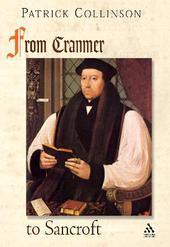
|
From Cranmer to Sancroft
Hardback
Main Details
| Title |
From Cranmer to Sancroft
|
| Authors and Contributors |
By (author) Prof Patrick Collinson
|
| Physical Properties |
| Format:Hardback | | Pages:292 | | Dimensions(mm): Height 234,Width 156 |
|
| Category/Genre | British and Irish History
Protestantism and Protestant churches |
|---|
| ISBN/Barcode |
9781852851187
|
| Classifications | Dewey:280.409 |
|---|
| Audience | | Undergraduate | | Postgraduate, Research & Scholarly | | Professional & Vocational | |
|---|
| Illustrations |
8
|
|
Publishing Details |
| Publisher |
Bloomsbury Publishing PLC
|
| Imprint |
Hambledon Continuum
|
| Publication Date |
17 March 2006 |
| Publication Country |
United Kingdom
|
Description
Patrick Collinson is the leading historian of English religion in the years after the Reformation. This collection of essays ranges from Thomas Cranmer, who was burnt at the stake after repeated recantations in 1556, to William Sancroft, the only other post-Reformation archbishop of Canterbury to have been deprived of office. Patrick Collinson's work explores the complex interactions between the inclusive and exclusive tendencies in English Protestantism, focusing both on famous figures, such as John Foxe and Richard Hooker, and on the individual reactions of lesser figures to the religious challenges of the time. Two themes throughout are the importance of the Bible and the emergence of Puritanism inside the Church of England.
Author Biography
PATRICK COLLINSON, Emeritus Regius Professor of Modern History at Cambridge, is the author of Godly People and The Religion of Protestants.
Reviews"In Patrick Collinson's From Cranmer to Sancroft, two archbishops stand as stern-faced alpha and omega for a collection of essays written by the preeminent historian of early modern religion in England. Those clerical bookends are apt, for Collinson is interested in trajectories-in beginnings and perhaps, in the case of English Christianity, ends. John Bossy once famously wrote of Elizabethan Catholicism that it was "a progress from inertia to inertia in three generations," and Collinson, in homage, states that Protestant dissent in early modern East Anglia "travels full circle from minority enthusiasm to minority enthusiasm in five or six generations" (p. 26); this volume, for its part, could be said to move from complex if weak archbishop to complex if weak archbishop, with a rich reserve of dissenters, separatists, and international Calvinists residing in between." -Sarah Covington, Catholic Historical Review, November 2008 'learned, playful, just a little self-indulgent, and has rapier wit. Patrick Collinson is one of our greatest church historians.' -- Alec Ryrie * Church Times * 'Collinson uses his characteristic brand of elegant humour and human sympathy to sketch the lineaments of that often misunderstood and maligned beast, the Puritan. More than any other modern historian, he has brought the Puritans home, back into the Church of England.' Diarmaid MacCulloch, The Spectator -- Diarmaid MacCulloch * Spectator, The *
|